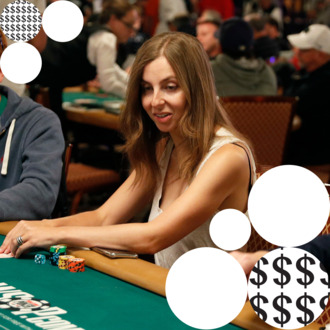![]()
Maria Konnikova.
Photo-Illustration: by Stevie Remsberg; Photo Shutterstock
Get That Money is an exploration of the many ways we think about our finances — what we earn, what we have, and what we want. As part of the series, we’re interviewing successful women about how they feel about their bank balances.
When Maria Konnikova took up poker for the first time in 2017, she wasn’t in it for the money. Instead, the author and New Yorker writer — who also has a Ph.D. in psychology — learned the game as research for her latest book, The Biggest Bluff, which comes out later this year. Within months, though, she was winning — big. At 2018’s PCA national championship, Konnikova beat out 290 competitors for $84,600 in prize money, plus a $30,000 package to enter a future tournament. That win gave her the confidence to put her book on hold and start touring on the pro circuit, which she has done for the past year. Here’s how her winnings have changed her life — and how they haven’t.
Now that you’re a professional poker player, are you just rolling in it all the time?
It’s actually very expensive and very difficult. If you’re a tournament player, you have to be ready to not win any money for a long time. In one tournament, you can win $200,000 — an insane amount of money. But then you might play 20 tournaments in a row, each of which has a buy-in of $2,000 to $5,000, and you don’t cash in any of them. People can see online, “Wow, she won a quarter of a million dollars!” Which I did last year. But I actually made more like $10,000, because of all the tournaments where I bought in and did not cash. People underestimate just how expensive it is, and how time consuming. If you really want to, you can be playing all the time. Last year, when I made the transition to professional play, I traveled maybe eight months of the year in total. I know players who don’t even have an apartment and travel year round.
Winning $84,000 in a single poker tournament — does that change your life? Your day? What was that to you?
It definitely changed my day. But financially, it did not change my life because I’m on leave from The New Yorker. I’m actually making zero dollars right now from writing, which has never happened before. Poker’s my only income. You realize, “Okay, I just made $86,000. However, it’s January, and this is potentially my only income for the year.” To continue playing, I also have to pay for hotels and airfare. A lot of poker players end up going broke because they think they have all this money, but they don’t account for things like taxes. Poker earnings get taxed very highly — almost 60 percent. The number can shrivel up quickly. You suddenly realize, “Wow, this is actually not that much money.”
What’s the difference between tournament poker and normal poker?
Cash games are what people normally think of when they think of poker. People buy in for $100, and get $100. If you lose it, you can re-buy in. Tournament poker is very different. Players buy in for certain amount, let’s say, $1,000, and 90 percent of of them walk away with zero. Only 10 or maybe 12 percent of the field is going to cash. It’s usually a very steep payout structure. If there are 100 people in the tournament, and ten people get paid, tenth place might be $1,500. So really, you only make $500, not enough to cover the cost of the trip. You have to make first or second place to actually make money. What you really want is a deep run — getting to the final table, to that top-heavy end of the payout structure. The tournaments that I play on often have over 1,000 players, and more than 900 of them are going home with zero dollars.
So, is it the way to get rich, and you just haven’t gotten rich yet?
I don’t think it’s the way to get rich. Poker is really hard. But the biggest tournament in the world, the World Series of Poker main event? First place this year was over $8 million. The person who won that, their life has changed.
If you’re unlikely to get rich, why become a professional poker player?
It’s a legitimate question. I find the game fascinating. I enjoy it. I think it’s made me a better decision-maker, a stronger person outside of poker. And it’s very compatible with writing. I can write from anywhere.
What is it about you that really suits you to this game?
Women make good poker players because in a male-driven society, we’ve had to be much more sensitive to social cues. We’ve had to read people much better. I’m not saying women are inherently better at this. I think we’ve had to become better at it as a survival mechanism. Because men can be boors and still rule the world, but women really need to know what’s going on. One thing that’s really been helpful to me is my ability to control my emotions — to be present at the table and read people in a way that men normally haven’t needed to.
My idea of poker is that you’re distrustful of everyone. You’re trying to read their tells, to judge what they’re really thinking.
Trust everyone, and people will take advantage of you. Distrust too much? That’s just as bad — you’re going to be the one calling every hand, thinking everyone’s always bluffing you, out to get you. You need to figure out when to distrust and when to trust.
How does that apply beyond the poker table?
One of the things I think is really important is “trust but verify.” Whenever something sounds exactly on point, exactly right, and you really want to believe it — that’s the moment when you need to verify the most. It runs very counter to human psychology. Here’s the thing: When it comes to you, nothing is too good to be true. It’s too good to be true for someone else. But you always think, “Oh, I deserve this. This is evidence of how smart I was in making this decision.” Poker forces you to let go of that very, very quickly. Because if you think that way you’re going to lose a lot of money.
Where else have you used this tactic? Has it helped you with other investments?
I’m usually quite conservative when it comes to my money. For example, over the last few years, the poker world has overlapped heavily with the cryptocurrency world, and I had an opportunity to make some crypto investments. But I did not do it. It felt to me like all of the cons that I’d been researching — it didn’t smell right. People I respected were like, “You have to put money in this. You’re stupid not to.” But now, I’m very happy that I listened to my own expertise in this area, rather than doing something I didn’t understand, just because everyone was telling me it was a good idea.
Did you immigrate here as a child?
Yeah, I was born in Moscow. I grew up in Acton, a northwest suburb of Boston that was pretty wealthy, in an old-school New England way. My mom was single at the time, and that had a big impact on how I relate to money because we didn’t have any. I definitely remember not not being able to wear the same clothes as my classmates because mine were secondhand. I didn’t speak any English. I did not have a very good elementary school experience. But my mom and later my stepdad were incredible at teaching me that you really can derive joy in life from experiences, not money. To me that’s always been my number one priority. I don’t need the designer handbag. I just want to be with people I love and do fun things.
You grew up poor, yet you chose the life of a writer, which does not have a lot of financial security.
I always wanted to be a writer. I’m a Russian Jew, which usually means there’s pressure to be a doctor or a lawyer — be successful — but my mom and stepdad were not like that at all. They said, “Listen, we can’t support you financially. You will always have a house to come back to, but we can’t give you money. Still, go forth. If you want to be a writer, figure out a way to make it work.” And more recently, they’ve become huge poker fans.
How good are you at negotiating around writing and the money that you need to make for it?
I used to be absolutely terrible, but poker has made me better. I’ve had a few situations since I learned poker where I got more money because I read a situation better. But I don’t like negotiating — it goes against the grain of my personality. Poker forces you to deal with those uncomfortable situations.
How do you play it differently now?
The No. 1 rule of poker: No one knows what cards you have. All they know is the information that you convey. I think that’s a very valuable thing to remember in any negotiation.

